
ROAS, or return on Ad spend, is a valuable metric to track when advertising on Facebook.
By knowing your ROAS, you can determine whether or not your ads are profitable and make changes as required to increase your returns.
There is one more metric called ROI, or Return on Investment used by many marketers.
Lots of people use these terms interchangeably, however they are not aware that there’s a difference between the 2.
So in this blog post, we will be discussing about :
What ROAS and ROI are,
How to calculate them,
Difference between them,
What is a good ROAS for Facebook ads, and
How to improve your returns
If you follow the tips in this post, you can optimize your Facebook advertising campaigns for maximum profitability.
Let’s start!
Facebook return on ad spend (ROAS) is a metric to calculate how much money you make from each dollar spent on advertising.
It gives you an analysis of output gained against the investment in your Facebook ads.
You calculate ROAS by dividing your total revenue by the cost of your ads:
| ROAS = | Total Revenue |
| Ad Spend |
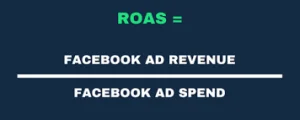
For example, if you are a Clothing brand that spent $25000 on Facebook ads for your Spring Sale. If you generated a revenue of $100,000 then, calculate your ROAS as
| ROAS = | $100000 | = 4x |
| $25000 |
It means you earned 4 times the amount you spent on your Facebook ads.
In other words, we can say that for every $1 spent, you are earning $4.

Check Whether Your Ads Are Profitable
Calculate Your ROAS (return on ad spend) now.
There is no exact formula to determine a good ROAS because it varies from industry to industry.
We categorize the industries into 2 types
Category 1: Who sell their products or services online and generate the revenue directly.
For such industries as e-commerce, you can use the below formula to calculate your target ROAS:
Target ROAS = Avg. Order Value/CPA (Cost Per Acquisition) FB ads.
For example, if a person’s average order value is $50 and it costs them $15 in advertising
to acquire one new customer, then their target ROAS would be:
Target ROAS = $50/$15 = 333.33 or a triple return on ad spend.
Category 2: It includes those who generate leads and further convert these leads through phone calls or email communication.
For such industries, you need to calculate the ROAS differently by considering factors like:
Lead values, and
Conversion rates
Thus, there’s no one-size-fits-all answer to this question, as the ROAS you should aim for will vary depending on your industry and what you’re selling.
But we can say that ROAS depends mainly on 3 factors:
Revenue
Margins
Operating cost
However, a good rule of thumb is to shoot for a target ROAS that is at least twice your original investment.
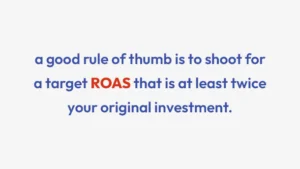
So, if you spend $100 on Facebook ads, aim for a target ROAS of at least $200.
Now that you understand what Facebook ROAS is, why it varies from industry to industry and how to calculate it, the next step is to improve your returns.
Here are a few ways to boost your ROAS:
It is important that you set realistic and achievable goals
Effective ads play an important role in any advertising campaign. If your ads are not effective, you will not make any money.
Always track the results of your campaigns so that you can see which ones are profitable and which ones need improvement.
Test, test, and test some more – that’s the only way to know what works and what doesn’t
If you have a profitable campaign, consider increasing your budget to increase your ROAS.
Use Custom Audiences to target people who are already interested in your product or service.
Marketers use ROAS as one of the metrics to analyze their marketing campaigns.
It matters so much when it comes to Facebook ads mainly for 2 reasons:
It gives insights into how much money you make from each dollar spent on advertising
It gives you an analysis of how effective your ad campaign is
8 Million+ Ready Automations
For 750+ Apps
ROI (Return On Investment) is the revenue generated against the overall investment. It includes the expenses on people, tools, along with the expenses on your ads.
Whereas , ROAS is the revenue you generate against the amount only spent on ads.
| ROAS = | Net Profit | X 100 |
| Net Spend |
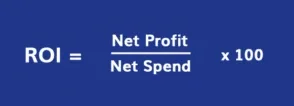
Revenue generated against the overall investment on tools, people,
Includes expenses on people, tools and ads
Determines the overall profitability
| ROAS = | Revenue Generated from Ads | X 100 |
| Advertising Spend |
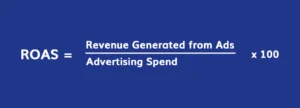
Revenue generated against only the ad expenditure
Includes expenses on people, tools and ads
Does not take into account any expenses except for ads
Gives you insights on your ad performance (like number of impressions /clicks/ revenue)
To better understand the difference between the 2, let us go through an example :
You spend $100 on ads and generate a revenue of $200. The amount spent on other things like software, personnel, etc is $150. Therefore,
| ROI = | -$50 | = -20% |
| $250 |
This indicates a loss of 20 %
| ROI = | -$200 | = 200% |
| $100 |
This indicates a 200% return
So if you measure your returns using ROAS, your ads are very effective. However in reality, the company is suffering a loss of 20%.
Hence, a Business needs to have both metrics to analyze the performance accurately.
All in all, use ROI to check your profitability, and if you find Facebook ads to be one of the contributors to your success, then focus on improving your ROAS.
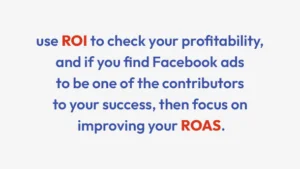
Thankfully, there are ways to increase the returns on your advertising dollars spent on Facebook.
Keep these tips in mind as you work to improve your Facebook ROAS, and watch those profits soar!